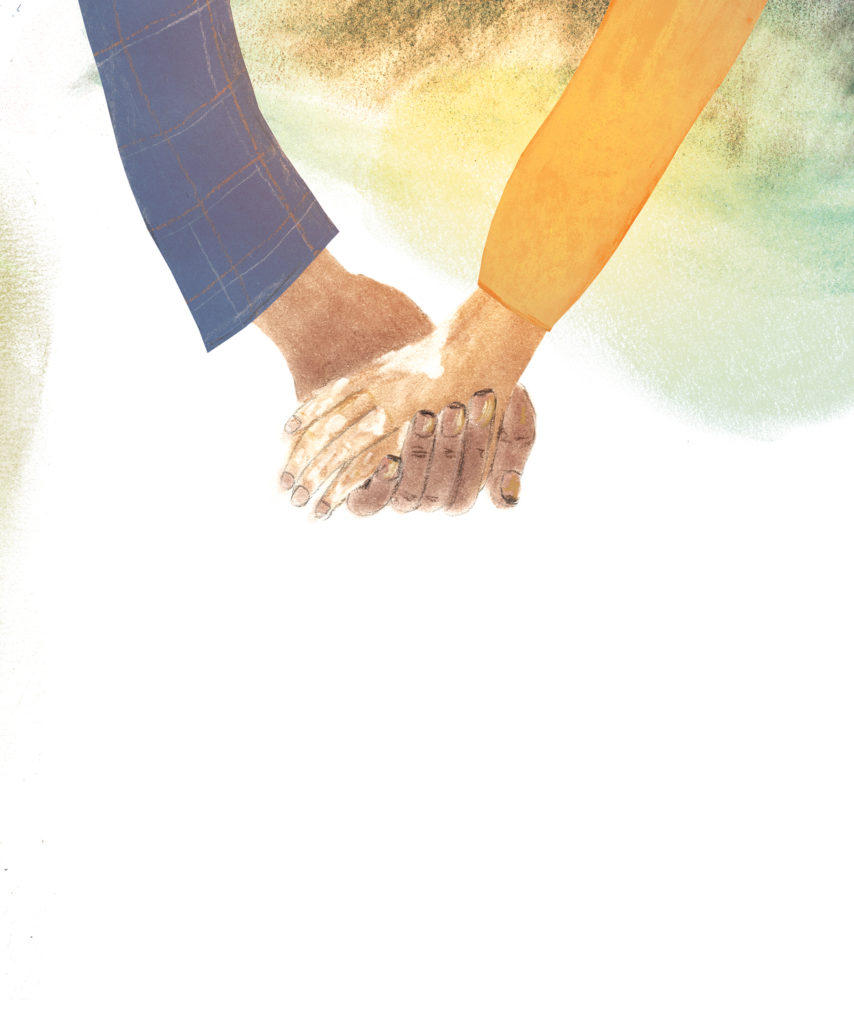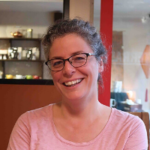Elliot loved clouds.
He loved them all. The dark grey ones frowning before a storm, the colourful ones blooming across the sunset sky, the fluffy ones stretching lazily as cats.
When Elliot talked about clouds, his father often called him The Poet.
In spring, summer and fall, when the weather was fine, Elliot and his father lay on their backs in the grass. They pointed at the sky.
His father’s hand was chocolate brown, with garden soil beneath the fingernails. Elliot’s was nearly the same colour, but in some places his milk chocolate skin seemed to be splashed with white chocolate.
“That one looks like an ice cream cone,” said Elliot, pointing to one cloud. “With three scoops!”
“Does that make you hungry?” His father chuckled.
“Very hungry.”
“Come on, let’s have a treat.”
The sweet shop on the corner sold all different kinds of candy, but best of all was the cotton candy. It was Elliot’s favourite because the spun sugar looked like fluffy clouds.
“I feel like I’m eating a cumulous cloud! And look—it makes my teeth, my tongue and my hands turn pretty colours, as if the clouds were painting me.”
“It looks a lot better than the white spots on my hands,” he thought to himself.
When Elliot waxed poetic, his father called him The Cloud Shoveller. Elliot wasn’t exactly sure what that meant, but he liked the expression.
He imagined he was a professional shoveller in a yellow snowsuit, perched on top of the tallest transmission tower to reach the clouds with his shovel.
He imagined he was clearing the sky, moving mountains of clouds to reveal the blue heavens, just as a snowplow clears the streets, making snowbanks on either side of the road.
It reminded him that the first snow would soon fall on his house. His heart leapt with joy at the thought of it. Elliot loved the snow. It looked to him like pieces of cloud falling like fluffy confetti.
He was eager to pull on his snow boots, his pink, yellow and blue snowsuit, and the hat his grandmother had knit for him.
Most of all, he couldn’t wait to pull on his thick mittens to hide his hands, which were losing more and more of their colour.
The colour of his skin faded a little more every day. White patches appeared on his fingers, like the teacher’s hands when she wrote on the chalkboard. Elliot’s hands also looked like they were dusted with chalk, except he couldn’t brush the dust off, not even when he rubbed hard. He thought he looked like a Dalmatian. And he didn’t like that.
One day when he got home from school, he decided to ask his parents about it.
“It’s because you’re a mixture of your mother and me,” his father answered. “You are two colours, like a yummy vanilla-chocolate ice cream cone.”
“Or like my café au lait,” added his mother, pouring warm frothy milk into her cup of black coffee.
“Yes, but your coffee and milk mix together evenly. Why do the coffee and the milk leave marks on my skin?” Elliot wanted to know.
“It’s ok to have marks on your skin,” his father reassured him. Look at my hands.
Elliot’s father planted flowers. His fingers were often stained with dirt, even after he washed them.
“Mine too,” added his mom. “Look.”
His mom fixed cars. Her hands were often stained with oil, even after she scrubbed and scrubbed them.
But the boy was not satisfied with that explanation. His own patches were useless. He wished that they proved he had worked hard all day long, a sign he had really accomplished something.
At school, his classmates, intrigued, started asking questions. “Why are you changing colour?” “Did you stick your hands in a bucket of paint?” “Will you turn all white like Michael Jackson?”
Elliot was ashamed. He pulled his sleeves down to his knuckles. He just couldn’t wait for the snow to come so he could hide his hands inside his brightly coloured gloves.
Would it ever snow? the boy wondered, looking up at the grey sky outside. When would the clouds turn into fluffy cotton confetti?
That day in art class, the students made charcoal drawings. Elliot loved it. The charcoal was so easy to smudge. He made shadows, layers, effects as ephemeral as clouds. Best of all: the charcoal made dark patches on his fingers, just like his parents got at work.
When he looked at his darkened hands, he imagined he was a gardener like his father, a mechanic like his mother. He glanced at the other children, their hands as black as his. In that moment, Elliot felt normal.
“It’s time to wash your hands,” announced the teacher.
Elliot didn’t want to wash the charcoal off his hands. He hung back while the others washed the artistic dirt from their fingers. While they giggled and splashed each other, Elliot just wanted to cry. He did not want to be the boy with the patchy skin again.
“You too, Elliot! Go over to the sink!”
“Wash your hands!”
Reluctantly, he went over to the sink to wash away the precious dirt. He gingerly washed his hands with only a tiny bit of soap but he still washed away all the charcoal. The water running over his hands revealed his palms as they really were: the hands of a ghost.
Elliot went home with his hands in his pockets and a lump in his throat.
The depigmentation of his skin had spread to his wrists.
How far would it go? “If my colour disappears altogether, will I disappear too?” he worried.
That night, the first snow fell. It covered the roof of Elliot’s house, as if a cloud had fallen asleep there and didn’t get up in the morning. Lots of clouds are sleeping in, all over the ground, the boy thought, looking out his bedroom window.
He was so pleased that before he even had his breakfast, he put on his snowsuit, boots, hat and mittens, and he went outside with his shovel. He cleared off the balcony, tossing the snow into the air.
He imagined the snowflakes swirling toward the sky, forming new clouds in wonderful shapes. He shovelled so energetically that some of the snow sifted inside his mittens.
Pulling them off, he noticed that his hands seemed paler than ever, as if the snow had stained his skin. That’s when it dawned on him.
Elliot ran inside to tell his parents.
“Dad, Mom, I know why I have these patches on my skin! It’s because I really, truly, absolutely am a cloud shoveller!”
“I work hard, too!”
His parents smiled, proud of their son. They tickled him and cuddled him with their dirt- and oil-stained hands.
Elliot went to school wearing his big bright mittens. In the hallway, he removed his winter armour. As usual, the others noticed his hands.
Some said: “Look, Elliot has clown hands!” Others: “No, he’s a mime!”
Elliot rolled up his sleeves to his elbows and strode into the classroom.
“Actually, these are the hands of a cloud shoveller!”
He thought to himself, tonight I have a lot of work to do. I think I’ll clear the sky so we can have some sunshine tomorrow.
Dedication by Simon Boulerice
In class one day I saw a boy pulling his sleeves down over his fingers. I asked him if he was cold. He said no, he just didn’t want people to see the white spots on his hands, caused by vitiligo.
To you, who tried to hide your hands, to you who should never be ashamed of them: This book is for you.
Simon
Vitiligo
The word “vitiligo” comes from the Latin vitulum, which means “white spot.” It is a disease that causes a progressive depigmentation of the skin. It affects about five people in one thousand. The disease can affect anyone, regardless of gender or skin colour, and it is not contagious.
The only symptom of the disease is the formation of white patches on the skin. The patches are not itchy or painful.
There is no cure for vitiligo, but a number of treatments are available to slow its progression.
Many people with vitiligo feel ashamed of their spots, but they shouldn’t, because so often our little imperfections are what make us unique.
Texte original de Simon Boulerice et illustrations de Josée Bisaillon
Copyright © Les éditions la courte échelle, 2018




 Louise Hinton is a writer and translator in Montréal, now working with the Ministère de l’Éducation. As a freelancer, Louise once worked in children's publishing, and continued to share her passion for children's literature through Les livres dans la rue, reading aloud to children in city parks and libraries. She also collaborated on the translation of Bolero, a novel for adults. Author photo by Evelyn Stepanek.
Louise Hinton is a writer and translator in Montréal, now working with the Ministère de l’Éducation. As a freelancer, Louise once worked in children's publishing, and continued to share her passion for children's literature through Les livres dans la rue, reading aloud to children in city parks and libraries. She also collaborated on the translation of Bolero, a novel for adults. Author photo by Evelyn Stepanek.